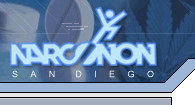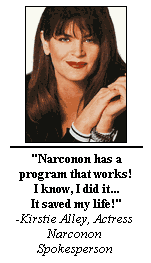

| 1-800-871-4350 |
 |
 |
 |
 |
 |
 |
 |
 |
 |
 |
| NARCONON FACTS |
|
An important aspect of the Narconon program is the systematic application of techniques to improve communication and interpersonal skills in persons dependent on alcohol and/or drugs. Narconon provides a specific course of drug rehabilitation treatment which includes training in communication, a full body detoxification process, counseling in problem identification and solving, as well as counseling in personal values and integrity. The key to developing the Narconon Program has been what works, not fads, and not what is politically correct. A Narconon graduate is not left with the urge to relapse, nor does he need to be put on other medications to make him stable. Narconon graduates are brought back to life: confident, in control and able to achieve their goals without the use of drugs. |
| RESOURCES |
 |
How to Talk to Your Kids
First
and foremost it is important to be educated about drugs yourself. This site and
others can provide you with information as well as the books and materials that
Narconon International offers. There are many other resources available, including
several government websites that provide basic drug information, current news,
and study results.
Also
important is how you talk to your kids. What has never worked in any drug education
is to tell a person something from an authoritative viewpoint. As soon as one
starts in with that approach, the child will immediately tune the person out.
A better approach is to ask them questions and then provide basic, true information.
One can just ask "What have you heard about drugs that is good?"
At this point is is very important for the parent to simply listen to the child's response without interrupting them. Give them your full attention, no matter what they say, be patient and listen carefully.
When they have finished telling you the good things they have heard about drugs, we have found it is best to just say "thank you" or "I understand" to the communication they just gave you. This helps give your child confidence that they can talk to you and that you are interested in what they have to say. It's like having communication with your best friend, only this one happens to be your child.
Now that they have told you what they heard that was positive about drugs, it is time to get them the correct information. The objective is to give the child correct information so they can make sound decisions on their own. We have found that when young people are given the accurate information about drugs their attitude about them changes and they make their own decisions not to use them. Their own solid decision will carry them a long way.
When providing them with information, ensure that they fully understand it. Consult their understanding and ask for an example of what they have just learned. If they ask a question that you can't answer, it is important that you are honest with them and don't try and make something up. Use the opportunity to work with them to find the answer.
Honestly, patience and good communication are the key to talking to your kids about drugs. Getting their questions answered will help ensure they make the right decision not to use drugs.
There are many signs, both physical and behavioral, that indicate drug use. Each drug has it's own unique manifestations but there are some general indications that a person is using drugs.
- Sudden change in behavior
- Mood swings-irritable and grumpy and then suddenly happy and bright
- Withdrawal from family members
- Careless about personal grooming.
- Loss of interest in hobbies, sports, and other favorite activities.
- Changed sleeping pattern; up at night and sleeps during the day.
- Red or glassy eyes
- Sniffly or runny nose
The
following are some of the signs and symptoms of specific drug use:
Methamphetamines:
"Wired," sleeplessness for days and weeks at a time, total loss of appetite, extreme
weight loss, dialated pupils, excited, talkative, deluded sense of power, paranoia,
depression, loss of control, nervousness, unusual sweating, shaking, anxiety,
hallucinations, aggression, violence, dizziness, mood changes, blurred vision,
mental confusion, agitation.
Cocaine:
Impaired thinking, confused, anxious, depressed, short tempered, panic attacks,
suspiciousness, dilated pupils, sleeplessness, loss of appetite, decreased sexual
drive, restlessness, irritability, very talkative, scratching, hallucinations,
paranoia.
LSD (Acid):
Dilated pupils, skin discoloration, loss of coordination, false sense of power,
euphoria, distortion of time and space, hallucinations, confusion, paranoia, nausea,
vomiting, loss of control, anxiety, panic, helplessness, and self destructive
behavior.
PCP: Sometimes violent or
bizarre behavior, suicide has often occurred, paranoia, fearfulness, anxiety,
aggressive or withdrawn, skin flushing, sweating, dizziness, total numbness, and
impaired perceptions.
Inhalants:
Short-lasting euphoria, giggling, silliness, dizziness. Then come the headaches
and full-blown "faintings" or going unconscious. Longterm Use: Short-term memory
loss, emotional instability, impairment of reasoning, slurred speech, clumsy staggering
gait, eye flutter, tremors, hearing loss, loss of sense of smell, and escalating
stages of brain atrophy. Sometimes these serious longterm effects are reversible
with body detoxification and nutritional therapy; sometimes the brain damage is
irreversible or only partially reversible.
Heroin:
Chemically enforced euphoria. "Nodding," which is a dreamlike state, near
sleep, drifting off for minutes or hours. For long time abusers heroin may act
like a stimulant and they can do a normal daily routine; however, for others,
it leaves them completely powerless to do anything.
Marijuana:
Compulsive eating, bloodshot red eyes that are squinty (they may have trouble
keeping them open), dry mouth, excessive and uncontrollable laughter, forgetfulness,
short term memory loss, extreme lethargy, delayed motor skills, occasional paranoia,
hallucinations, laziness, lack of motivation, stupidity, sickly sweet smell on
body, hair, and clothes, and strong mood changes and behaviors when the person
is "high".
Depressants:
(Tranquilizers and Barbituates): Decreased inhibition, slowed motor coordination,
lethargy, relaxed muscles, staggering gait, poor judgement, slow, uncertain reflexes,
disorientation, and slurred speech.
| Quote |

 |
| Link
to Us! |
Show your support, link to us! |
 Funding pledged to fight drug abuse
Funding pledged to fight drug abuse
